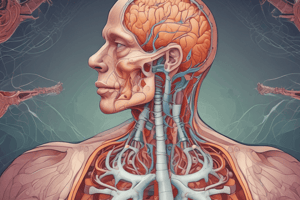Podcast
Questions and Answers
What is gaseous exchange?
What is gaseous exchange?
Gaseous exchange is the process by which gases, such as oxygen and carbon dioxide, are exchanged between an organism and its environment.
What are the primary organs involved in gaseous exchange in humans?
What are the primary organs involved in gaseous exchange in humans?
The primary organs involved in gaseous exchange in humans are the lungs.
Describe the process of gaseous exchange in the lungs.
Describe the process of gaseous exchange in the lungs.
In the lungs, gaseous exchange occurs through the diffusion of oxygen from the alveoli into the bloodstream, and the diffusion of carbon dioxide from the bloodstream into the alveoli to be exhaled.
Which of the following is NOT a primary organ involved in gaseous exchange in humans?
Which of the following is NOT a primary organ involved in gaseous exchange in humans?
Which of the following is the main gas exchanged during gaseous exchange in the lungs?
Which of the following is the main gas exchanged during gaseous exchange in the lungs?
What is the purpose of gaseous exchange in living organisms?
What is the purpose of gaseous exchange in living organisms?
Flashcards are hidden until you start studying
Study Notes
Gaseous Exchange
- Gaseous exchange refers to the process by which organisms exchange gases with their environment, primarily oxygen and carbon dioxide.
- It is essential for cellular respiration, which fuels metabolic processes.
Primary Organs Involved in Gaseous Exchange in Humans
- Lungs are the main organs responsible for gaseous exchange.
- Alveoli, tiny air sacs in the lungs, provide a large surface area for gas diffusion.
- Diaphragm facilitates breathing by contracting and relaxing to change lung volume.
Process of Gaseous Exchange in the Lungs
- Inhalation: Air enters the lungs, and oxygen diffuses from alveoli into the bloodstream.
- Oxygen binds to hemoglobin in red blood cells for transport to tissues.
- Exhalation: Carbon dioxide, produced by cell metabolism, diffuses from blood into alveoli to be expelled from the body.
Primary Organs Not Involved
- Kidneys are not involved in gaseous exchange; their primary function is filtration and regulation of body fluids.
Main Gas Exchanged in the Lungs
- Oxygen is the main gas exchanged during gaseous exchange, while carbon dioxide is removed as a waste product.
Purpose of Gaseous Exchange in Living Organisms
- Gaseous exchange is vital for providing oxygen, necessary for aerobic respiration.
- It helps maintain acid-base balance by regulating carbon dioxide levels in the blood.
Studying That Suits You
Use AI to generate personalized quizzes and flashcards to suit your learning preferences.




